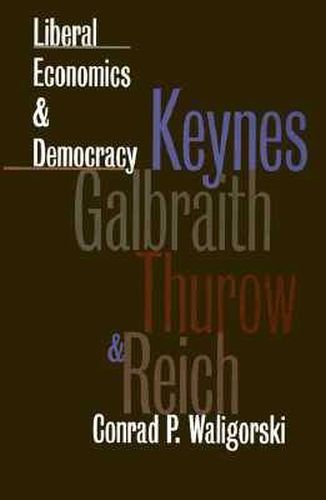Readings Newsletter
Become a Readings Member to make your shopping experience even easier.
Sign in or sign up for free!
You’re not far away from qualifying for FREE standard shipping within Australia
You’ve qualified for FREE standard shipping within Australia
The cart is loading…






This title is printed to order. This book may have been self-published. If so, we cannot guarantee the quality of the content. In the main most books will have gone through the editing process however some may not. We therefore suggest that you be aware of this before ordering this book. If in doubt check either the author or publisher’s details as we are unable to accept any returns unless they are faulty. Please contact us if you have any questions.
Assailed by conservative critics in Congress, academia, and television talk shows, liberal economics may be in a fight for its political life. Conrad Waligorski contends, however, that rumors of its death are premature and far from desirable. His close analysis of the political theories of John Maynard Keynes, John Kenneth Galbraith, Lester Thurow, and Robert Reich reveals why liberal economics remains a vigorous force in the debates over our nation’s future. Waligorski argues that, despite individual differences, these economists are bound together by a common vision of the public good. Collectively, these thinkers represent a strong counter tradition to the laissez-faire, free-market philosophy of James Buchanan, Milton Friedman, F. A. Hayek, Newt Gingrich, and other proponents of minimalist government and trickle-down economics.
Contrary to such critics, liberal economists advocate government regulation as a guard against the power of the marketplace to erode our most cherished political values and social institutions. For these economists, a completely free market is definitely not the best market for democracy; an unrestrained market guarantees neither fairness nor prosperity and in Keynes’ time nearly destroyed our nation.
Waligorski locates the roots of their tradition in the thought exemplified by American Progressives John Dewey and Louis Brandeis and British liberal L. T. Hobhouse. But he also shows that these economists are no ivory tower theorists, that they are genuinely engaged with real-world problems and politics. Indeed, all of these theorists have written for a broad public in an effort to influence public policy and all have been political activists and/or advisors at various points in their careers.
A fitting sequel and companion to Waligorski’s last book, The Political Theory of Conservative Economists, this new work provides a provocative challenge to the relentless conservative and libertarian attacks on the regulatory welfare state. Certainly, few debates will be more closely watched in this presidential election year.
$9.00 standard shipping within Australia
FREE standard shipping within Australia for orders over $100.00
Express & International shipping calculated at checkout
This title is printed to order. This book may have been self-published. If so, we cannot guarantee the quality of the content. In the main most books will have gone through the editing process however some may not. We therefore suggest that you be aware of this before ordering this book. If in doubt check either the author or publisher’s details as we are unable to accept any returns unless they are faulty. Please contact us if you have any questions.
Assailed by conservative critics in Congress, academia, and television talk shows, liberal economics may be in a fight for its political life. Conrad Waligorski contends, however, that rumors of its death are premature and far from desirable. His close analysis of the political theories of John Maynard Keynes, John Kenneth Galbraith, Lester Thurow, and Robert Reich reveals why liberal economics remains a vigorous force in the debates over our nation’s future. Waligorski argues that, despite individual differences, these economists are bound together by a common vision of the public good. Collectively, these thinkers represent a strong counter tradition to the laissez-faire, free-market philosophy of James Buchanan, Milton Friedman, F. A. Hayek, Newt Gingrich, and other proponents of minimalist government and trickle-down economics.
Contrary to such critics, liberal economists advocate government regulation as a guard against the power of the marketplace to erode our most cherished political values and social institutions. For these economists, a completely free market is definitely not the best market for democracy; an unrestrained market guarantees neither fairness nor prosperity and in Keynes’ time nearly destroyed our nation.
Waligorski locates the roots of their tradition in the thought exemplified by American Progressives John Dewey and Louis Brandeis and British liberal L. T. Hobhouse. But he also shows that these economists are no ivory tower theorists, that they are genuinely engaged with real-world problems and politics. Indeed, all of these theorists have written for a broad public in an effort to influence public policy and all have been political activists and/or advisors at various points in their careers.
A fitting sequel and companion to Waligorski’s last book, The Political Theory of Conservative Economists, this new work provides a provocative challenge to the relentless conservative and libertarian attacks on the regulatory welfare state. Certainly, few debates will be more closely watched in this presidential election year.